
The Ichneumonidae, also known as ichneumon wasps, ichneumonid wasps, ichneumonids, or Darwin wasps, are a family of parasitoid wasps of the insect order Hymenoptera. They are one of the most diverse groups within the Hymenoptera with roughly 25,000 species described as of 2016. However, this likely represents less than a quarter of their true richness as reliable estimates are lacking, along with much of the most basic knowledge about their ecology, distribution, and evolution. It is estimated that there are more species in this family than there are species of birds and mammals combined. Ichneumonid wasps, with very few exceptions, attack the immature stages of holometabolous insects and spiders, eventually killing their hosts. They thus fulfill an important role as regulators of insect populations, both in natural and semi-natural systems, making them promising agents for biological control.

Johann Ludwig Christian Carl Gravenhorst, sometimes Jean Louis Charles or Carl, was a German entomologist, herpetologist, and zoologist.
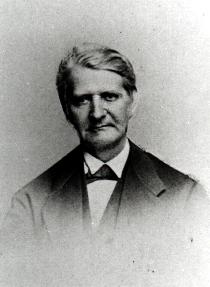
Arnold Förster was a German entomologist, who worked mainly on Coleoptera and Hymenoptera.

The Braconidae are a family of parasitoid wasps. After the closely related Ichneumonidae, braconids make up the second-largest family in the order Hymenoptera, with about 17,000 recognized species and many thousands more undescribed. One analysis estimated a total between 30,000 and 50,000, and another provided a narrower estimate between 42,000 and 43,000 species.
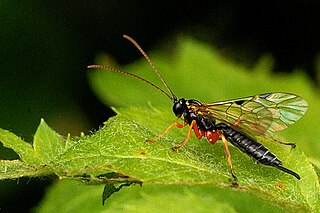
Pimplinae are a worldwide subfamily of the parasitic wasp family Ichneumonidae.

Acaenitinae is a subfamily of the parasitoid wasp family Ichneumonidae. Female Acaenitinae have a large triangular projecting genital plate.

Ichneumoninae is a worldwide subfamily of the parasitic wasp family Ichneumonidae.

Campopleginae is a large subfamily of the parasitoid wasp family Ichneumonidae with a world-wide distribution. Species in this subfamily have been used in the biological control of the alfalfa weevil, clover weevil, various species of Heliothis, oriental army worm, European corn borer, larch sawfly, and others.
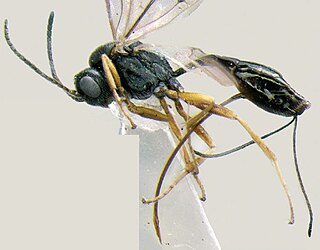
Tersilochinae is a worldwide subfamily of the parasitic wasp family Ichneumonidae.

The Labeninae is a subfamily within the parasitoid wasp family Ichneumonidae. The family is divided into 12 extant genera grouped within four tribes.
Gerd Hermann Heinrich was a German entomologist and ornithologist known for his studies of parasitic Hymenoptera of the Ichneumonidae family and for the description of several bird species in Celebes, Dutch East Indies.

Trogus is a genus of parasitoid wasp found in the Holarctic and Neotropic regions. It is placed in the subfamily Ichneumoninae and the tribe Ichneumonini. Trogus species are parasites of larvae and pupae of the swallowtail butterfly family, Papilionidae. The genus consists of twelve extant and one extinct species.
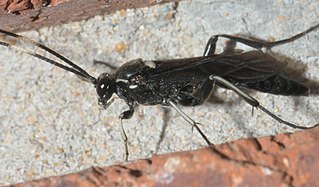
Ichneumonini is a tribe of ichneumon wasps in the family Ichneumonidae. There are more than 350 genera and thousands of described species in Ichneumonini.

Netelia is a genus of ichneumonid wasps in the subfamily Tryphoninae. There are over 330 described species in Netelia grouped into 12 subgenera.
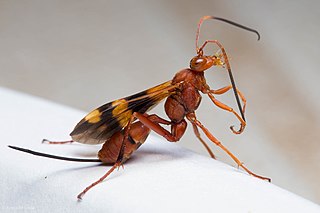
Compsocryptus is a genus of ichneumon wasps in the family Ichneumonidae.
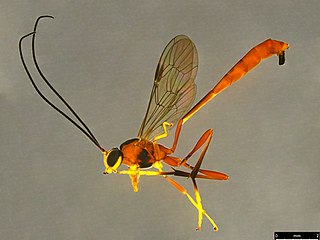
Habronyx is a genus of parasitoid wasps belonging to the family Ichneumonidae. The species of this genus are found in Europe, Australia, and North and South America.
Benjaminia is a genus of parasitoid wasps belonging to the family Ichneumonidae.

Platylabus is a genus of parasitoid wasps belonging to the family Ichneumonidae.

Acaenitus is a genus of Ichneumonid wasp.

















